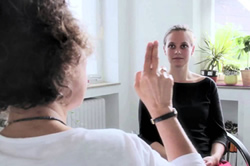Email :arobert@bigpond.net.au
Call : 0403 542 139
aboutanne robertson
Anne Robertson is an experienced clinical and counselling psychologist who provides psychological treatment from her Mornington practice and by telehealth (videoconference and phone). Anne works with adult individuals and couples with a large variety of psychological presentations including trauma, depression, anxiety, eating disorders, stress, grief/loss and relationship distress utilising a variety of therapeutic interventions. To provide the most effective treatment for her clients Anne is committed to enhancing her clinical skills and knowledge by: keeping up-to-date with current literature and research, regularly engaging in specialist and peer supervision, and participating in professional conferences and workshops.
Anne is also a recognised provider of supervision for psychology registrars and psychologists including those seeking clinical and counselling endorsement.
Anne utilises a range of evidence-based therapeutic treatments including: Cognitive Behaviour Therapy, Acceptance and Commitment Therapy, Dialectical Behaviour therapy, Eye Movement Desensitisation and Reprocessing, Mindfulness, Hypnosis and Schema Therapy. Specific therapeutic interventions are then matched to the unique needs of each client as well as the identified purpose and goals of the therapy treatment.
Anne works collaboratively with clients in a person-centred, non-judgemental manner to develop and achieve identified therapeutic goals. Over the course of therapy Anne assists clients to develop the skills and knowledge needed both during and after treatment to maintain good psychological health and to continue to improve their quality of life.

anne'squalifications
- Diploma of Teaching
- Graduate Diploma of Student Welfare
- Bachelor Of Arts (Social Science)
- Graduate Diploma of Counselling Psychology
- Master of Psychology (Counselling)
- Clinical Hypnosis (Aust Assoc Clinical Hypnosis)
- EMDR Training
- Supervision Training
professionalassociations
- Australian Psychological Society (APS) Full Member
- Clinical College of APS Full Member
- Counselling College of APS Full Member
- Australian Society of Hypnosis (ASH) Assoc. Member
- Eye Movement Desensitisation & Reprocessing Association of Australia (EMDRAA) Member
- Fertility Society Australia (FSA) Member
- Australian and New Zealand Infertility Counsellors Association (ANZICA) Member
feesand rebates
Anne provides services under Medicare, Workcover, TAC, NDIS, Victims of crime, DVA, Private Health Insurance and Open Place. Accepted forms of payment include cash, EFTPOS, Visa and MasterCard.
If you receive a referral and a GP Mental Health Care Plan from your GP you are entitled to a Medicare rebate for a maximum of 10 individual sessions per calendar year.
Treatment therapies

CBT (Cognitive Behaviour Therapy)
This therapy acknowledges that there may be behaviours that cannot be controlled through rational thought, but rather emerge based on prior conditioning from the environment and other external and/or internal stimuli. Cognitive behaviour therapy helps clients understand the thoughts and feelings that influence behaviours.

EMDR (Eye Movement Desensitisation & Reprocessing)
EMDR therapy is used to help with the symptoms of post-traumatic stress disorder. The goal of EMDR is to reduce the long-lasting effects of distressing memories by developing more adaptive coping mechanisms.

DBT (Dialectical Behaviour Therapy)
DBT is a therapy designed to help people change patterns of behaviour that are not helpful, such as self-harm and suicidal thinking. It helps people increase their emotional and cognitive regulation by learning about the triggers that lead to reactive states and helps to assess which coping skills to apply.

ACT (Acceptance and Commitment Therapy)
ACT uses acceptance and mindfulness strategies mixed in different ways with commitment and behaviour-change strategies, to increase psychological flexibility. The objective is not elimination of difficult feelings; rather, it is to be present with what life brings us and to "move toward valued behaviour".

Schema Therapy
Schema therapy is an innovative psychotherapy for personality disorders, chronic depression, and other difficult problems individuals and couples face. It integrates elements of cognitive therapy, behaviour therapy, object relations, and gestalt therapy into one unified, systematic approach to treatment.

IPT (Interpersonal Psychotherapy)
IPT is a time-limited treatment typically lasting 12–16 weeks that encourages the client to regain control of mood and functioning. IPT is based on the principle that there is a relationship between the way people communicate and interact with others and their mental health.

Internal Family Systems Therapy
The Internal Family Systems Model (IFS) is an integrative approach to individual psychotherapy developed by Richard C. Schwartz. It combines systems thinking with the view that mind is made up of relatively discrete subpersonalities each with its own viewpoint and qualities.

Motivational Interviewing
This is a method that works on facilitating and engaging intrinsic motivation within the client in order to change behaviour. It is a goal-oriented, client-centred counselling style for eliciting behaviour change by helping clients to explore and resolve ambivalence.

Meditation & Relaxation
This is a deep relaxation method that stills the mind and stops the constant chatter in your head. When this internal dialogue ceases the mind settles. Because the mind and the body are so closely related, when the mind is still, the body can begin to relax too.

Hypnosis
Hypnosis is a state of human consciousness involving focused attention, reduced peripheral awareness, and an enhanced capacity for response to suggestion. It is typically used in therapy to allow modification of behaviour.
Anne Robertson Psychologist | All Rights Reserved | Website Designed by Half A Sec

